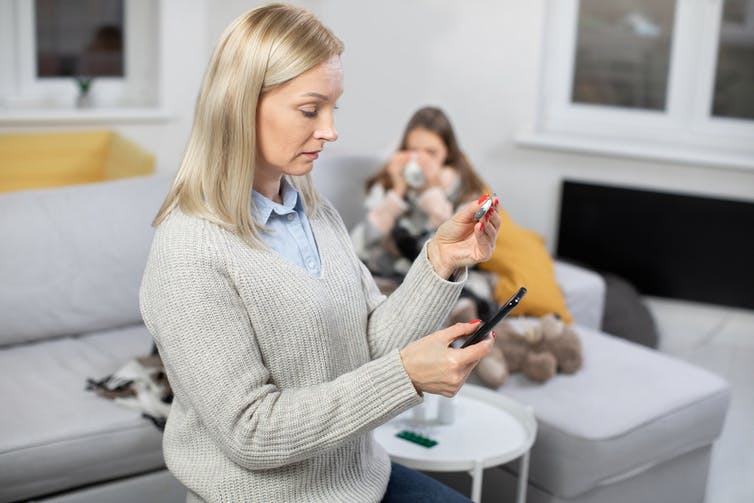The recovery in September confirms the extent to which the Covid-19 pandemic has permanently disrupted working methods. Close to 20,000 teleworking agreements have been signed in recent months in France, and teleworking has even made its appearance in the public sector. The fact of being physically distant from the offices and of no longer meeting colleagues and managers in the corridors makes access to informal information more difficult, and contributes to the now well-known syndrome of FOMO (“Fear of Missing Out” that the can be translated as “fear of missing something”).
To compensate for this lack and this feeling of professional isolation, many embark on an immoderate use of the smartphone; in 2021, until 21% French declare themselves unable to do without their smartphone. As indicated by a study recently initiated by Google, the increase in teleworking – which plays a protective role during pandemics and can have many advantages elsewhere – nevertheless raises the question of the intrusion of professional life into personal life, and the development of behaviors compulsive like smartphone addiction.
Intrusions into personal life
This addiction, or more precisely the problematic smartphone addictionalthough affecting the entire population, is beginning to be seriously studied among French workers.
Indeed, the latter use their smartphone for 40% of them outside their working hours on weekdays, and for a third during the weekend. Beyond the impact of these intrusions into personal life, it is also the quality of sleep that is threatened since 20% of working people say they consult their smartphone before going to bed, and even during the night for 15% of them.
This behavior of dependence vis-à-vis technologies, and more specifically the smartphone, sometimes turns into a pathology which now bears a name: “nomophobia”, or phobia of the absence of a mobile phone. It particularly affects young people: 40% of those under 18 say they cannot do without their smartphone for more than five minutes. This rate drops to 30% for “millenials” (25-30 years old).
But if more and more of us never set foot on the ground before having consulted our smartphone when we wake up, we are much less able to know how to control this automation. To achieve this, the regular practice of mindfulness meditation can help. This is what emerges from the study that we conducted with 874 active adults (with the support of the meditation application Little Bamboo and the teaching center The 8th week) to better understand the behavioral mechanism leading to problematic smartphone addiction.
In accordance with Previous workour results first suggest that the cognitive aspects of addiction – and in particular the obsessive thoughts giving rise to mental impulses – are indeed at the heart of the addictive phenomenon leading to the loss of behavioral control.
The next question that then arises, and which constitutes the challenge of research on smartphone addiction, is how to regain control over these compulsive acts. In this regard, mindfulness meditation practices have shown their benefits for other types of addiction, such as gambling addiction, to drugs or food – with the latter being very popular “Mindful Eating” programs. They significantly improve self-regulation capacities.
In the case of smartphone addiction, the practice of mindfulness allows the creation of a space between the stimulus (a new message that appears, a call, or simply the sight of the smartphone) and the response (grabbing his smartphone). A “conscious” choice therefore becomes possible: stay focused on the activity in progress, or consult your device.
“Leave yourselves alone! »
Reclaiming this decision, regaining control of our behaviors, dramatically alters the behavioral responses to the impulses we experience. Our results confirm that regular practice of mindfulness meditation significantly reduces problematic smartphone addiction.
If there are training programs for the practice of mindfulness meditation, such as the now famous program “Mindfulness-Based Stress Reduction (MBSR)” by American medical professor John Kabat-Zinn (1990), more and more people are accessing meditation… via their smartphone.
Meditation applications such as PetitBambou – which has announced that it has reached the 8 million users this summer – offer introductory or in-depth programs, adapted to the age of users, their interests (work, health or sport) or their immediate needs (sleep, flight, meals, etc.).
Our study reveals that the frequency of meditation increases with the fact of having followed an MBSR-type training, but also with the use of meditation applications on smartphones. Although rarer, spiritual retreats such as days in silence also seem effective in supporting the practice.
Our study thus contributes to highlighting the liberating role that mindfulness can play in our lives filled with injunctions, where we sometimes become our own tyrants. As the philosopher says Fabrice Midal : ” ‘You must’ ? Get away from it all! and finally rediscover the taste for life”.
We wish to thank the writer of this post for this remarkable web content
What if meditation helped you drop your phone?
Take a look at our social media accounts along with other related pageshttps://nimblespirit.com/related-pages/

